喜福会英文背景及人物赏析
英文版---喜福会影评
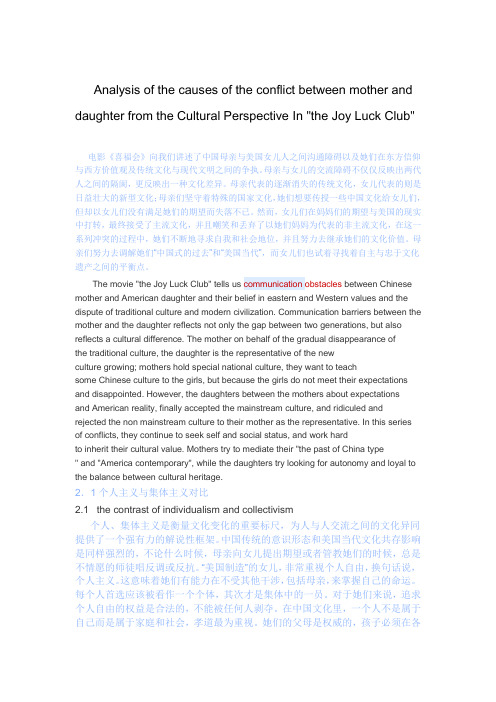
Analysis of the causes of the conflict between mother and daughter from the Cultural Perspective In "the Joy Luck Club"电影《喜福会》向我们讲述了中国母亲与美国女儿人之间沟通障碍以及她们在东方信仰与西方价值观及传统文化与现代文明之间的争执。
母亲与女儿的交流障碍不仅仅反映出两代人之间的隔阂,更反映出一种文化差异。
母亲代表的逐渐消失的传统文化,女儿代表的则是日益壮大的新型文化;母亲们坚守着特殊的国家文化,她们想要传授一些中国文化给女儿们,但却以女儿们没有满足她们的期望而失落不已。
然而,女儿们在妈妈们的期望与美国的现实中打转,最终接受了主流文化,并且嘲笑和丢弃了以她们妈妈为代表的非主流文化,在这一系列冲突的过程中,她们不断地寻求自我和社会地位,并且努力去继承她们的文化价值。
母亲们努力去调解她们“中国式的过去”和“美国当代”,而女儿们也试着寻找着自主与忠于文化遗产之间的平衡点。
The movie "the Joy Luck Club" tells us communication obstacles between Chinese mother and American daughter and their belief in eastern and Western values and the dispute of traditional culture and modern civilization. Communication barriers between the mother and the daughter reflects not only the gap between two generations, but also reflects a cultural difference. The mother on behalf of the gradual disappearance ofthe traditional culture, the daughter is the representative of the newculture growing; mothers hold special national culture, they want to teachsome Chinese culture to the girls, but because the girls do not meet their expectations and disappointed. However, the daughters between the mothers about expectationsand American reality, finally accepted the mainstream culture, and ridiculed andrejected the non mainstream culture to their mother as the representative. In this seriesof conflicts, they continue to seek self and social status, and work hardto inherit their cultural value. Mothers try to mediate their "the past of China type" and "America contemporary", while the daughters try looking for autonomy and loyal to the balance between cultural heritage.2.1个人主义与集体主义对比2.1 the contrast of individualism and collectivism个人、集体主义是衡量文化变化的重要标尺,为人与人交流之间的文化异同提供了一个强有力的解说性框架。
喜福会英文观后感ReviewsonTheJoyLuckClub——电影《喜福会》英文影评、观后感
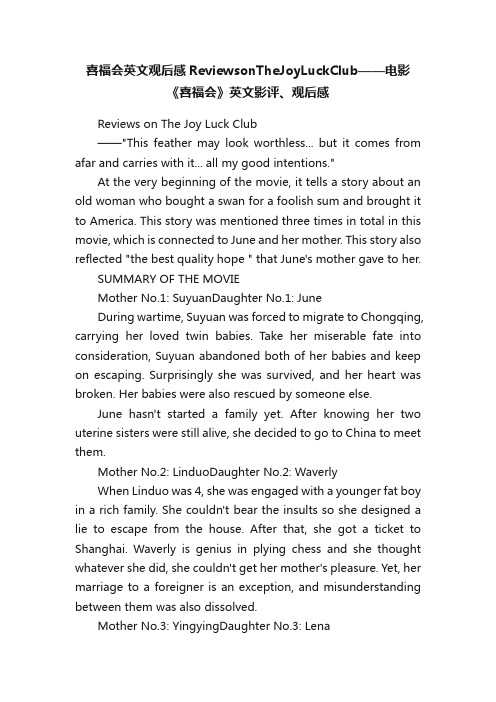
喜福会英文观后感ReviewsonTheJoyLuckClub——电影《喜福会》英文影评、观后感Reviews on The Joy Luck Club——"This feather may look worthless... but it comes from afar and carries with it... all my good intentions."At the very beginning of the movie, it tells a story about an old woman who bought a swan for a foolish sum and brought it to America. This story was mentioned three times in total in this movie, which is connected to June and her mother. This story also reflected "the best quality hope " that June's mother gave to her.SUMMARY OF THE MOVIEMother No.1: SuyuanDaughter No.1: JuneDuring wartime, Suyuan was forced to migrate to Chongqing, carrying her loved twin babies. Take her miserable fate into consideration, Suyuan abandoned both of her babies and keep on escaping. Surprisingly she was survived, and her heart was broken. Her babies were also rescued by someone else.June hasn't started a family yet. After knowing her two uterine sisters were still alive, she decided to go to China to meet them.Mother No.2: LinduoDaughter No.2: WaverlyWhen Linduo was 4, she was engaged with a younger fat boy in a rich family. She couldn't bear the insults so she designed a lie to escape from the house. After that, she got a ticket to Shanghai. Waverly is genius in plying chess and she thought whatever she did, she couldn't get her mother's pleasure. Yet, her marriage to a foreigner is an exception, and misunderstanding between them was also dissolved.Mother No.3: YingyingDaughter No.3: LenaWhen Yingying was 16, she fall in love with a very handsome man and became pregnant before they got married. Their marriage was a failure, and she had no choice but kill her baby in order to "take away the only thing that she shears with her polygamous husband.Lena also had an unsuccessful marriage, she and her husband count every bill in completely detail, they take "fifty-fifty" policy. After being enlightened by her mother, she knew what to do.Mother No.4: AnmeiDaughter No.4: RoseAnmei's mother was raped by a man of wealth and was forced to be the man's fourth wife. Although her family members didn't trust her explains and evicted her from the house, she still loves her old ill mother and cut her own flesh to cure her dying mother.Rose got married with a boss owing a big wine chateau, however, all things she had done to her husband didn't pay off ---her husband's dishonesty drove their marriage to breakdown even had had a lovely daughter.Suyuan, Linduo, Yingying and Anmei, those four Chinese woman's story is the highlight of the movie. They were all insulted and maltreated by Chinese old feudalism in the old society. In order to lead a happy life, they moved to America to build up a new family. Thankfully, their daughters' life are not too bad as theirs and they speak fluent American English.The movie presents the four daughters' personal life, and then lead us to the four ladies' gloomy experience skillfully. Playing mahjong, reading the letter and gathering at the banquet are also the dispensable parts.There are a few points that impressed me:Firstly—the story behind the swan feather. The feather is an embodiment of the hope that Suyan delivered to June, and the hope also represented June' two twin sister. Secondly—fluent American English spoken by those several old Chinese woman and their yellow skin daughters. Fluent American English represented that the four ladies has live in America for many years and they have been accustomed to the American lifestyle. Thirdly—layouts in the four ladies' house and the garments they four wear. There are many antique stuffs with Chinese style scattering in the house. The clothes were also typical in Chinese style.At the end of the movie, June met her two twin sisters, she told them that their mother had already dead, and they burst into tears, simultaneously, so do I.The four ladies migrated from China to America, and brought their cultural background to there anddelivered it to their daughters. It was their mothers' tough experience that taught the girls to learn to be strong and excellent in their own life.(All the contents are written by myself, not derive from the Internet)四川农业大学英语系周记民2016.6.26。
女性主义经典之作《喜福会》

女性主义经典之作《喜福会》前两天,一位其貌不扬的中年阿姨火了。
说到原因则是她的一场“逃离”,一场对于婚姻和家庭的逃离。
在过去的三十年里,这位苏姓阿姨一直和自己的丈夫貌合神离,生活的费用和开销也是AA制。
“我甚至连对沙发的使用权也没有!”视频里苏阿姨云淡风轻地语气难掩深深的落寞之情。
她在那辆自己购买的小汽车上,微笑地对大家说:“我发这个视频就是想唤醒那些和我一样的中国女性,要走自己的路,为自己活一次!”朴素直白的语言,却一下子戳中了无数中年女人的泪点,也同时让那些被生活里的琐碎消磨到浑浑噩噩的女人们警醒:作为女人我们究竟应该怎么样活着?如果你想弄清这个问题,我建议你翻翻《喜福会》(The Joy Luke Club)。
作为华裔小说家谭恩美的处女作,《喜福会》一经面市,便造成了巨大的轰动,斩获各类大奖,成为经久不衰的畅销书。
在书中,谭恩美通过塑造一个个饱满的女性形象,不仅表现出了母女之间的深情,也以母亲的悲惨命运和女儿们的不幸婚姻为切入点,讲述了她们如何遭受男权社会的压迫以及走向反抗的过程,逐步让读者明白:女性寻找自我的过程,是异常艰辛的,但是即便如此,我们仍然不能放弃,不能认命,应当让世界听到我们的声音,即使微弱,也是一种力量!1九岁那年,许安梅再次见到了自己的母亲,尽管此时,她在安梅的眼中形同陌路,但是她仍认出了她,安梅说:“我知道她就是我的母亲,因为我能感受到她的痛苦。
”在母亲离开的那些年里,她对于母亲所有的印象来自于外婆,那个生养了母亲的女人。
“永远都不要提你母亲的名字。
说她的名字无异于往你父亲的坟头啐了一口。
”安梅的母亲出现的时候,外婆已经提不起力气来骂她了,因为她已经病入膏肓。
她就这样出现在外婆面前,舅母用恶毒的话咒骂她,她不回嘴;舅舅抽了她一个耳光,她也只是把头低得更深了。
多年前,因为守寡失节,嫁给了有钱人做小老婆,母亲早已被这个家族驱逐。
即使她早已不被家族承认,当外婆病重时,作为女儿她仍顶着巨大的压力和漫天的谩骂回到母亲身边,用一种最极端的方式进行最后一次忏悔——“母亲在自己的手臂上割下一片肉,眼泪从她的脸上淌下,血,也搭啦搭啦地滴在地板上。
中西文化差异视角下《喜福会》翻译与赏析

中西文化差异视角下《喜福会》翻译与赏析作者:邓珊珊来源:《青年文学家》2015年第14期摘要:以美国华裔女作家谭恩美的代表作《喜福会》为代表的亚裔文学一直是展现中西文化差异的平台。
然而长久以来对亚裔文学中表现的中西方文化差异研究主要集中在文学领域,翻译界却较少。
本文以《喜福会》的翻译版本为例,从《喜福会》及其作者简介出发,分析中西方文化的差异,继而从翻译的角度进一步表现中西方文化的差异。
关键词:中西方文化差异;《喜福会》;翻译作者简介:邓珊珊(1982-),女,籍贯:河北省石家庄市,单位:河北中医学院讲师,在读硕士研究生,研究方向:英美语言文学。
[中图分类号]:H315.9 [文献标识码]:A[文章编号]:1002-2139(2015)-14-0-01一、中西方文化差异分析(一)风俗文化的差异在世界各国,由于每个国家发展的背景和历史不同,就造成了每个国家形成了他们各自独特的民族风俗文化,另外,文化的形成不是一朝一夕就形成的,而是历经几代甚至几十代人的不断积累和继承形成的,这也反映了文化本身继承性和发扬性的特点。
正是由于每个国家民族文化的不同,因此,各国文化在相互交流和翻译的过程中就出现了一些差异。
举例来说,在中国每当过年时,我们要贴红色的春联,穿红色的一幅,不仅代表喜庆,也代表着我们对即将到来的新一年的美好祝福;但是在国外,红色仅仅代表着颜色的一种,并没有其他的特殊含义,这就体现了两者在这方面的文化差异。
总体而言,从民族风俗文化上无不体现着中西方的差异。
(二)思维方式的差异早在古代时期,孔子孟子就提出了影响我国人们做人做事及思维方式的思想,即:中庸之道。
可以说,在我国五千年的发展脉络中,“中庸之道”一直贯穿其中,它指导着中国人无论在说什么做什么都主张一种不偏不坡的方法,既不追求突出自己,也不使得自己落后于众人之后,既不会使得自己过于显眼,也不至于使得自己得罪他人。
但是在国外人看来,中国的这种“中庸之道”却是他们极其不能理解的。
《喜福会》评析
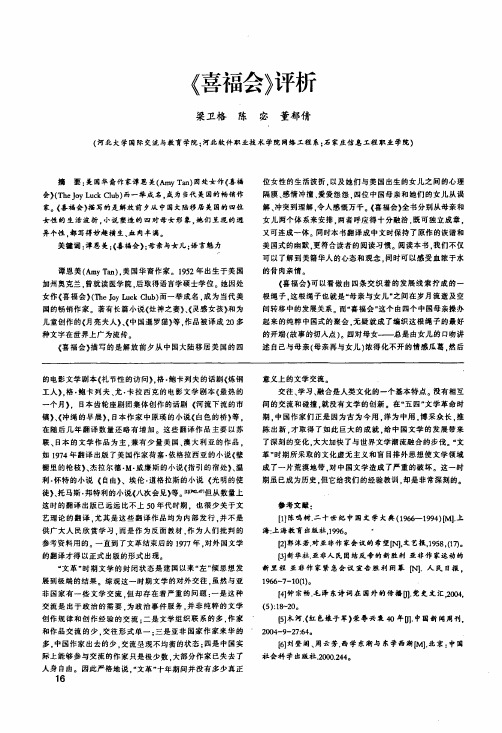
(河北大学国际交流与教育学院;河北软件职业技术学院网络工程系;石家庄信息工程职业学院)摘要:美国华裔作家谭恩美(A m yT an)因处士作《喜福会}(The l oyLu c kC I ub)而一举成名.成为当代美国的畅销作家。
《喜福会》描写的是解放前夕从中国大陆移居美国的四位女性的生活波折.小说塑造的四对母女形象,她们呈现的迥异个性.都写得妙趣横生、血肉丰满。
关键词:谭恩美;《喜福会>;母亲与女儿;语言魅力谭恩美(A m y Tan)。
美国华裔作家。
1952年出生于美国加州奥克兰.曾就读医学院.后取得语言学硕士学位。
她因处女作《喜福会)(The JoyLuckC l ub)而一举成名,成为当代美国的畅销作家。
著有长篇小说《灶神之妻》、《灵感女孩》和为儿童创作的《月亮夫人》、《中国暹罗猫》等,作品被译成20多种文字在世界上广为流传。
《喜福会》描写的是解放前夕从中国大陆移居美国的四位女性的生活波折.以及她们与美国出生的女儿之同的心理隔膜、感情冲撞、爱爱怨怨.四位中国母亲和她们的女儿从误解、冲突到理解,令人感慨万千。
<喜福会》全书分别从母亲和女儿两个体系来安排。
两者呼应得十分融洽,既可独立成章,又可连成一体。
同时本书翻译成中文时保持了原作的诙谐和美国式的幽默,更符合读者的阅读习惯。
阅读本书。
我们不仅可以了解到美籍华人的心态和观念.同时可以感受血浓于水的骨肉亲情。
<喜福会》可以看做由四条交织着的发展线索拧成的一根绳子.这根绳子也就是“母亲与女儿”之间在岁月流逝及空间转移中的发展关系。
而。
喜福会”这个由四个中国母亲操办起来的纯粹中国式的聚会.无疑就成了编织这根绳子的最好的开端(故事的切入点)。
四对母女——总是由女儿的口吻讲述自己与母亲(母亲再与女儿)浓得化不开的情感瓜葛。
然后的电影文学剧本《礼节性的访问》,格.鲍卡列夫的话剧《炼钢工人》,格鲍卡列夫、尤.卡拉西克的电影文学剧本《最热的一个月’.日本齿轮座剧团集体创作的话剧《河流下流的市镇>、《冲绳的早晨》,日本作家中原瑛的小说《白色的桥》等,在随后几年翻译数量还略有增加。
two kinds景梅的人物性格分析
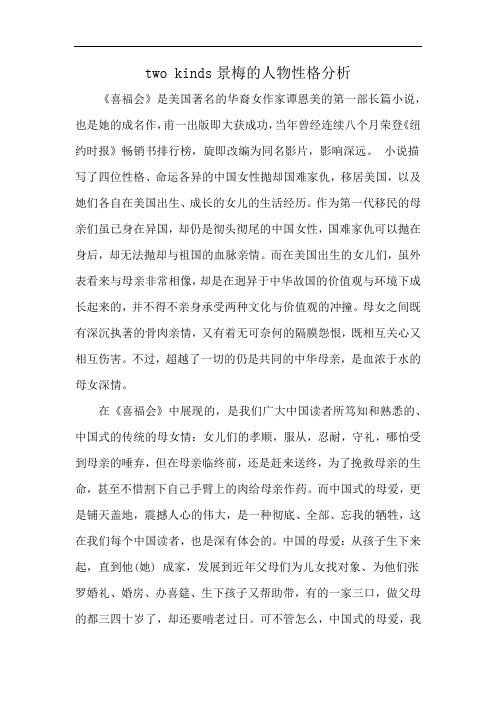
two kinds景梅的人物性格分析《喜福会》是美国著名的华裔女作家谭恩美的第一部长篇小说,也是她的成名作,甫一出版即大获成功,当年曾经连续八个月荣登《纽约时报》畅销书排行榜,旋即改编为同名影片,影响深远。
小说描写了四位性格、命运各异的中国女性抛却国难家仇,移居美国,以及她们各自在美国出生、成长的女儿的生活经历。
作为第一代移民的母亲们虽已身在异国,却仍是彻头彻尾的中国女性,国难家仇可以抛在身后,却无法抛却与祖国的血脉亲情。
而在美国出生的女儿们,虽外表看来与母亲非常相像,却是在迥异于中华故国的价值观与环境下成长起来的,并不得不亲身承受两种文化与价值观的冲撞。
母女之间既有深沉执著的骨肉亲情,又有着无可奈何的隔膜怨恨,既相互关心又相互伤害。
不过,超越了一切的仍是共同的中华母亲,是血浓于水的母女深情。
在《喜福会》中展现的,是我们广大中国读者所笃知和熟悉的、中国式的传统的母女情:女儿们的孝顺,服从,忍耐,守礼,哪怕受到母亲的唾弃,但在母亲临终前,还是赶来送终,为了挽救母亲的生命,甚至不惜割下自己手臂上的肉给母亲作药。
而中国式的母爱,更是铺天盖地,震撼人心的伟大,是一种彻底、全部、忘我的牺牲,这在我们每个中国读者,也是深有体会的。
中国的母爱:从孩子生下来起,直到他(她) 成家,发展到近年父母们为儿女找对象、为他们张罗婚礼、婚房、办喜筵、生下孩子又帮助带,有的一家三口,做父母的都三四十岁了,却还要啃老过日。
可不管怎么,中国式的母爱,我以为是世上罕见的一种牺牲,她们之所以心甘情愿这样,是因为她们的母亲,母亲的母亲,就是这么一代一代过来的。
可那些美国女儿们:虽然也是黑头发黄皮肤,其中有一位已经有一半的白人血液,但她们生在美国,长在美国,是由“可口可乐和意大利面喂大的”。
她们不懂,或者只能讲不能读中文,也不了解中国,把“太原”错听成“台湾”,她们确是地地道道的美国人了。
这些美国女儿也笃爱着自己的母亲,却不能忍受她们中国母亲的铺天盖地、无孔不入的母爱。
喜福会 The Joy luck club 剧情和影评(英文)
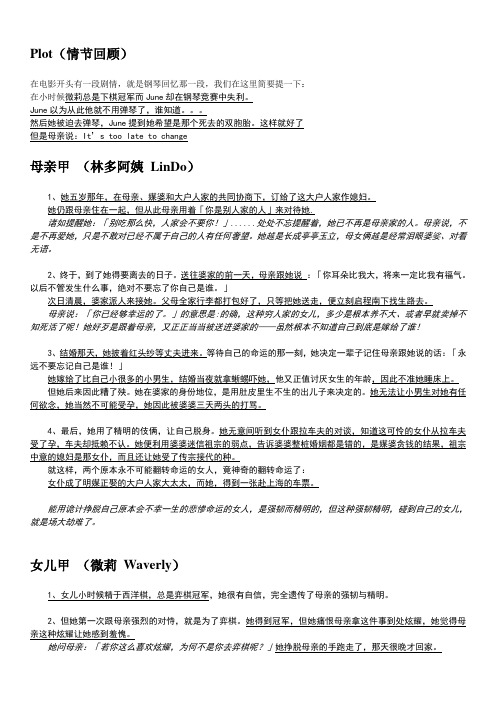
Plot(情节回顾)在电影开头有一段剧情,就是钢琴回忆那一段,我们在这里简要提一下:在小时候微莉总是下棋冠军而June却在钢琴竞赛中失利。
June以为从此他就不用弹琴了,谁知道。
然后她被迫去弹琴,June提到她希望是那个死去的双胞胎。
这样就好了但是母亲说:It’s too late to change母亲甲(林多阿姨LinDo)1、她五岁那年,在母亲、媒婆和大户人家的共同协商下,订给了这大户人家作媳妇。
她仍跟母亲住在一起,但从此母亲用着「你是别人家的人」来对待她.诸如提醒她:「别吃那么快,人家会不要你!」......处处不忘提醒着,她已不再是母亲家的人。
母亲说,不是不再爱她,只是不敢对已经不属于自己的人有任何奢望。
她越是长成亭亭玉立,母女俩越是经常泪眼婆娑、对看无语。
2、终于,到了她得要离去的日子。
送往婆家的前一天,母亲跟她说:「你耳朵比我大,将来一定比我有福气。
以后不管发生什么事,绝对不要忘了你自己是谁。
」次日清晨,婆家派人来接她。
父母全家行李都打包好了,只等把她送走,便立刻启程南下找生路去。
母亲说:「你已经够幸运的了。
」的意思是:的确,这种穷人家的女儿,多少是根本养不大、或者早就卖掉不知死活了呢!她好歹是跟着母亲,又正正当当被送进婆家的——虽然根本不知道自己到底是嫁给了谁!3、结婚那天,她披着红头纱等丈夫进来。
等待自己的命运的那一刻,她决定一辈子记住母亲跟她说的话:「永远不要忘记自己是谁!」她嫁给了比自己小很多的小男生,结婚当夜就拿蜥蜴吓她,他又正值讨厌女生的年龄,因此不准她睡床上。
但她后来因此糟了殃。
她在婆家的身份地位,是用肚皮里生不生的出儿子来决定的。
她无法让小男生对她有任何欲念,她当然不可能受孕,她因此被婆婆三天两头的打骂。
4、最后,她用了精明的伎俩,让自己脱身。
她无意间听到女仆跟拉车夫的对谈,知道这可怜的女仆从拉车夫受了孕,车夫却抵赖不认。
她便利用婆婆迷信祖宗的弱点,告诉婆婆整桩婚姻都是错的,是媒婆贪钱的结果,祖宗中意的媳妇是那女仆,而且还让她受了传宗接代的种。
解读电影《喜福会》中的女性形象
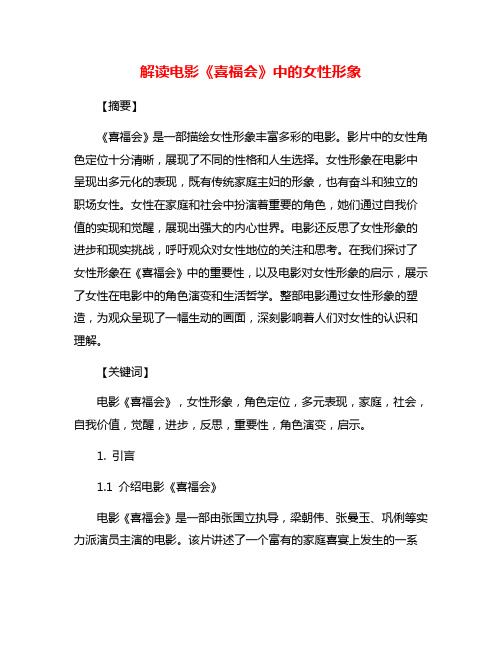
解读电影《喜福会》中的女性形象【摘要】《喜福会》是一部描绘女性形象丰富多彩的电影。
影片中的女性角色定位十分清晰,展现了不同的性格和人生选择。
女性形象在电影中呈现出多元化的表现,既有传统家庭主妇的形象,也有奋斗和独立的职场女性。
女性在家庭和社会中扮演着重要的角色,她们通过自我价值的实现和觉醒,展现出强大的内心世界。
电影还反思了女性形象的进步和现实挑战,呼吁观众对女性地位的关注和思考。
在我们探讨了女性形象在《喜福会》中的重要性,以及电影对女性形象的启示,展示了女性在电影中的角色演变和生活哲学。
整部电影通过女性形象的塑造,为观众呈现了一幅生动的画面,深刻影响着人们对女性的认识和理解。
【关键词】电影《喜福会》,女性形象,角色定位,多元表现,家庭,社会,自我价值,觉醒,进步,反思,重要性,角色演变,启示。
1. 引言1.1 介绍电影《喜福会》电影《喜福会》是一部由张国立执导,梁朝伟、张曼玉、巩俐等实力派演员主演的电影。
该片讲述了一个富有的家庭喜宴上发生的一系列故事,揭示了家族关系、权力斗争和人性的复杂性。
电影以其独特的叙事手法和深刻的人物塑造赢得了观众的好评。
《喜福会》以家庭为背景,通过不同女性角色的塑造展现了女性在家庭和社会中的多面性和复杂性。
影片中的女性形象丰富多彩,有传统的贤内助,也有独立自主的职业女性,她们各自展现了不同的人生态度和价值取向。
影片对女性的自我认知和觉醒也给观众留下了深刻的印象。
在电影《喜福会》中,女性形象的塑造不仅体现了电影的情节发展,更反映了当时社会对女性角色的认知和固有观念。
通过解读电影中女性形象的多重表现,我们可以更深入地理解电影中的人物关系以及故事情节的发展。
1.2 提出解读女性形象的重要性解读女性形象在电影《喜福会》中的重要性是非常必要的。
女性在社会中扮演着重要的角色,她们的形象不仅仅是为了衬托男主角的英雄形象,更是展现出女性在家庭和社会中的多样性和力量。
电影是一种艺术形式,它可以通过女性形象的表现来传递社会的价值观念和思想观念。
《喜福会》英文论文

The Joy Luck Club:Collision and Compatibility Between Chineseand American CultureAbstractThe Joy Luck Club, a masterpiece of Amy Tan,was one of the best-sellers in America in 1989;it is Amy Tan's first full-length novel.Amy Tan,American born Chinese,was born in Oakland,USA in 1952.The Joy Luck Club is about misunderstanding, collision and comprehension between the four groups of immigrant mothers and their American daughters.Under the influence of the daughters’defiance,the mothers realise chinese cultural marginalization in American cultural environment and confront the chinese cultural identity.At the same time,faced with the mothers’intervention, the daughters see the defect and shortage in American culture and accept the chinese culture heritage.The relationship between the mothers and the daughters reflects the collision and compatibility between Chinese and American culture and proclaims the possibility and inevitability in the development of compatibility between Chinese and American culture.Key words: The Joy Luck Club ,mother-daughter collision , mother-daughter compatibility, collision between Chinese and American culture, compatibility between Chineseand American culthre.《喜福会》中的中美文化的碰撞与融合摘要:《喜福会》是谭恩美的一部杰作,它是她的第一部真正意义上的小说,是美国在1989年畅销书之一。
喜福会
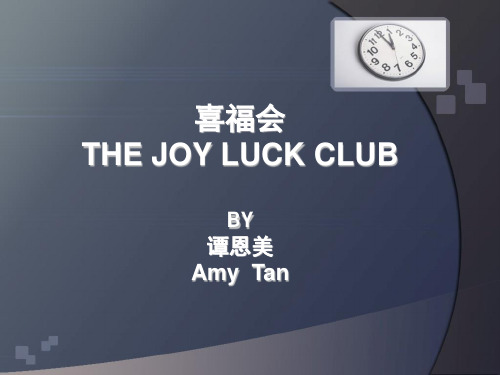
• 霍尔认为, 在高语境文化中,人们有着类似的 经历和信息渠道。长期稳定的交流使人们 形成了对周围环境比较一致的反应。 • 因而,在处理大量日常事务时,他们往往不需 要、也不希望得到过多的背景知识。在交 谈中,无需过多的表达,双方就会心领神会,因 为共同的背景知识和想象空间会帮助听者 把说者含糊的意思拼凑起来。 • 在高语境文化中, 人们并不仅仅通过语言来 表达意思,手势、空间的运用,甚至沉默都可 以传递信息 , 他们认为“沉默比语言更有 力” 。
• 新一代华人子女因为生活在与父母截然不 同的文化环境里, 受着美国文化的熏陶, 平 时读的是英文书籍, 而非孔子的经典,往往在 思想上更倾向于接受美国文化与价值观。 • 然而, 无论华裔青年已经美国化到何种程度, 以白人为代表的主流社会依然把他们看作 是少数民族, 是中国人。这使得新生代的华 裔极易产生一种迷茫和身份危机:“我究竟是 谁?”
• 因此,在这种环境中成长起来的华裔第二 代,由于内外压力,他们认同的是宗主国 文化,而故国的文化则是他们需要超越的 对象,女儿们的最终结果就是: “事实上, 除了她的头发和皮肤是中国式的外表,她 的内部,全是美国制造的。” • 这也导致母女间的隔阂。在这一成长故事 中,母女间的交流障碍实质上体现的是两 种不同价值观的矛盾,女儿们不断试图超 越和弃绝以母亲为代表的东方遗产,从而 形成新的主体性。
• 华裔女作家任璧莲(Gish Jen)在一次接受采访中 谈道:“这种对身份的追求是非常美国化的。在中 国的人们不会探讨根的问题。你一旦开始思考身 为爱尔兰裔美国人、非洲裔美国人或华裔美国人 意味着什么时, 那你就是美国人了。” • 《喜福会》中女儿们一旦有了想做中国人的迫切 愿望,这便表明她们已经非常美国化了,不再是中国 人。” • 既然她们已经是美国人了 ,便不用担心被中国文化 同化。她们渴求具有一定的中国气质 ,在某种程度 上也反映了美国人对异域文化的向往。
喜福会

In the film the Joy Luck Club, Amy Tan describes the conflicts between the mothers and the daughters. The misunderstandings between the mothers and the daughters in the film are caused by the different cultural backgrounds and experiences. Fortunately, through painful efforts, the mothers and the daughters begin to understand and communicate each other at the end of the story, which metaphorically demonstrates the transition of the relationship between Chinese and American culture from conflicts to blending.《喜福会》所讲述的是四位华人移民妇女和她们在美国长大的儿女各自之间的故事。
小说的题目《喜福会》原是母亲们打麻将的聚会。
这些妇女移居美国已有几十年,但她们仍念念不忘从小受过的传统教育,恪守着中国几千年来渗透于妇女血液之中、几乎已成为天性的封建男权的思想。
她们共同的理想就是要严格教育、管束自己的女儿,使她们能逃脱自己这一辈女人的命运,成为她们眼中幸福的女人。
然而,对于母亲的管束,女儿们则以各自不同的方式一味反抗,在这个种族、阶级、性别不平等的美国社会里,两代女性上演了一出由相互争斗到殊途同归、相互认同的悲喜剧。
在这出悲喜剧中,给人留下印象最深的不是人物口中道出的事情,而是那些她们无法启口、无法触及、讳莫如深的事情,是沉默背后的东西。
英文电影鉴赏——喜福会

plot overview
a movie made specifically for women.
• One of the mothers • Famous Chinese American actress • The first Asian lady who the world's most beautiful 50 people
• The United States of America Independent Spirit Award winner(美国独立精神 奖获得者) • A member of the American Screen Actors Guild and Oscar lifelong judges(美国演 员工会会员及奥斯卡终身评 委) • Main works:Heaven & Earth, Joy Luck Club,The Soong Sisters(宋家王朝),Turtles in
One of the mothers Famous Chinese
American actress
The first Chinese
academicians in RADA (Royal Academy of Dramatic Art)
The first Chinese 007
girl Main works:Memoirs of a Geisha (艺伎 回忆录),Joyቤተ መጻሕፍቲ ባይዱLuck Club,007 series The Story of the Stone (played a role of mother Jia)
After these family tragedies, her mother moved Amy and her younger brother to Switzerland, where Amy finished high school. During this period, Amy learned about her mother's former marriage to an abusive man in China.
喜福会影评
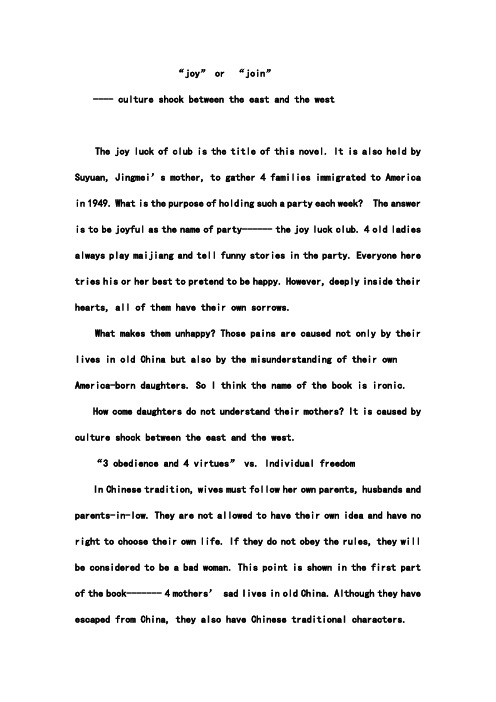
“joy”or “join”---- culture shock between the east and the westThe joy luck of club is the title of this novel. It is also held by Suyuan, Jingmei’s mother, to gather 4 families immigrated to America in 1949. What is the purpose of holding such a party each week? The answer is to be joyful as the name of party------ the joy luck club. 4 old ladies always play maijiang and tell funny stories in the party. Everyone here tries his or her best to pretend to be happy. However, deeply inside their hearts, all of them have their own sorrows.What makes them unhappy? Those pains are caused not only by their lives in old China but also by the misunderstanding of their own America-born daughters. So I think the name of the book is ironic.How come daughters do not understand their mothers? It is caused by culture shock between the east and the west.“3 obedience and 4 virtues”vs. Individual freedomIn Chinese tradition, wives must follow her own parents, husbands and parents-in-low. They are not allowed to have their own idea and have no right to choose their own life. If they do not obey the rules, they will be considered to be a bad woman. This point is shown in the first part of the book------- 4 mothers’sad lives in old China. Although they have escaped from China, they also have Chinese traditional characters.However, in America, children have equal rights with their parents. They can choose their own life in the way of they like. It is not difficult to understand why American-born daughters cannot like the way of their mothers educate them.Take Waverly for example. Lindo asks her daughter to play chess and take part in a contest. After winning the game, Lindo boasts her daughter’s prize to others. Waverly can not understand this way and even hate this. She wrangles with her mother. In her view, it is her own honor. And it is none business of her mother. She asks her mother that if she wants to show off, wins the game by herself.Mothers would like a daughter to obey their wills while daughters would like to be free and independent.Criticism Vs. EncouragementChinese parents express their love to children through criticism. On the contrary, the American people show affection through encouragement.For example, Suyuan always compares her daughter Jingmei with Waverly. She always puts out Jingmei’s bad points. These things make jingmei unhappy. She believes that her mother wants to control her and likes Waverly more than her. In order to show resistance to her mother, she decides not to play the piano that her mother tries her best to let her learn.Suyuan wants her daughter to became a swan, which represents her hope. She left fromChina for seeking a better way to live and finding a new lifestyle for women. She intent to let her daughter have been respected by others instead of being a Chinese traditional woman. However she fails. The failure is indicated at the beginning of the book. When su yuan arrived in America the immigration officials pulls her swan away from her, leaving the women fluttering her arms and with only one swan feather for a memory.It is a tragedy to Jingmei as she really has a talent for playing the piano. She does not realize it until her mother died. The treason for this tragedy is misunderstanding between 2 generations in different cultures.Chinese vs. EnglishThe linguistic barrier exists between each mother and their children. The children alsys complains their mothers’bad English mixed with Chinese words. They think their mothers are stupid while mothers think children know nothing. It shows that there is lack of communication between 2 generations.All of these show culture shock between the east and the west.At the end of the book, this situation is changed. Jingmei can understand her mother’s love; Lindo accepts Waverly’s husband who is a foreigner that she dislikes; Lena approves her value to her American husband after her mother’s advice…daughters starts to understand their mothers and the west can understand the east.Now I realize another meaning of the joy luck club. “Joy”stands for “join”It is a link between the 2 generations. In the party daughters and mothers have meals and communicate together. It is also the link between the east and the west. Mothers show Chinese dishes here and play Chinese traditional game---- maijiang. And all different colors friends gather here. It signs conciliatory of these 2 cultures.用一桌“三缺一”的麻将,牵出数个女子人生的悲欢离合,小说《喜福会》起首就不凡。
[女性主义,喜福,角度]从女性主义角度鉴赏电影《喜福会》
![[女性主义,喜福,角度]从女性主义角度鉴赏电影《喜福会》](https://img.taocdn.com/s3/m/cef84c108bd63186bdebbc16.png)
从女性主义角度鉴赏电影《喜福会》电影《喜福会》是根据美国华裔女作家谭恩美的成名作改编而成的。
电影讲述的是四位华人母亲移居美国后,和她们在美国长大的女儿们的冲突和最后因爱而融合的感人故事。
这部电影曾经跻身当年十大热门电影, 揭露了在父权制社会下女性无形中所受到的束缚和不公正待遇, 以及边缘化女性寻求和重塑自我以摆脱边缘境地的方式和途径。
16 个小故事大致可以分为四个部分,除了第一和第四部分由母亲叙述以外,其他的两个部分大致都是由各自女儿一代的当事人来叙述的,涉及吴、钟、苏、圣四个家庭,七个叙述者。
本文从女性主义的角度出发,探求并分析男权社会对妇女的压抑和束缚,揭示妇女在男权社会中自我的迷失和自我意识的苏醒,以此来阐释电影的女性主义特征。
一、故事梗概电影讲述了四位母亲的经历和遭遇。
喜福会是在桂林时,几个女子给麻将聚会取的名字。
发起这个俱乐部的母亲叫做吴素云,她年轻的时候经历了内战,在战争中失去了一对双胞胎女儿,后到了美国重新开始了新生活,又有了现在的女儿吴精美;许安梅小时候经历了丧母的痛苦,母亲自杀后,她一人来到美国;龚琳多是个童养媳,十二岁就嫁到了婆家,备受婆婆的冷落和欺辱,最终骗过婆家人,来到了美国重新结婚成家;盈盈当年被丈夫遗弃,从富家小姐到贫苦百姓,过了十来年清贫生活后,跟一个美国人结了婚,来到了美国。
二、女性主义理论背景女性主义最早作为一种妇女解放运动产生于 19世纪末期的法国,后来逐渐在世界范围内流行开来,不仅包括初期女权运动争取各种政治权利的社会斗争,而且包含着在法律、教育和文化领域内批判与建构的理论研究。
千百年来,男性一直垄断着话语权以确保自身的绝对权威地位,女性则一直被认为是第二性或从属于他人的人。
中国的传统文化中有夫者妻之天之说。
在西方,如同《圣经》所描绘的,女人是男人的一根肋骨造成,female 和 woman 直接以 male 和 man 作词根, 表达了男权文化对女性持有的根本性的偏见女人是男人的一个旁枝末节,是男人的派生物。
喜福会电影英文影评

The Joy Luck Club, as stated in the movie's opening narrative, is a collection of four aging Chinese women bound together more by hope than joy or luck. The four women - Suyuan (Kieu Chinh), Lindo (Tsai Chin), Ying Ying (France Nuyen), and An Mei (Lisa Lu) - came to America many years ago to escape China's feudal society for the promise of the United States' democracy. Now, however, Suyuan has died and the three surviving members of the club invite her daughter June (Ming-Na Wen) to take her place. June belongs to the "new" generation, those of Chinese heritage who grew up speaking English and learning American customs. Also of roughly the same age are Waverly (Tamlyn Tomita), Lindo's daughter; Lena (Lauren Tom), Ying Ying's daughter; and Rose (Rosalind Chao), An Mei's daughter. The Joy Luck Club tells of the varied difficulties and tragedies involved in these mother/daughter relationships.Co-writer Ronald Bass (who, along with Amy Tan, adapted from Tan's novel) says that there are sixteen separate stories in The Joy Luck Club. Since I didn't count, I can't verify this statement, but it sounds about right. Taken as a whole, these vignettes combine to lend greater meaning to the whole. The Joy Luck Club is the sum total of its parts with common themes giving solid grounding and greater resonance to the overall film. As Bass comments, "I saw all the mothers' and daughters' stories as facets of the same experience. Put together, they formed a mosaic. That's the genius of the book, and if we cut it down to just a couple of stories it would be like any other movie."The stories are not related in such a manner as to seem pared down or truncated, nor is their presentation confusing, thanks to acleverly-orchestrated framing scene with the principal characters gathered together. However, it is apparent that a lot more could have been told, and we're left wondering about all that we didn't get to see. The characters are mostly well-developed, but it's tantalizing to consider how much fuller some of them could have been with a different plot structure.The Joy Luck Club is clearly - perhaps too clearly - an adaptation of a book. The dialogue is often too poetic to be real, and the story too clearly plotted to be acceptable as anything more than an imperfect reflection of the world we live in. The line between drama and melodrama is a fine one, and, while The Joy Luck Club most often successfully navigates the tightrope, there are times when it slips and comes across as heavy-handed. This film is no stranger to moments of manipulation.The characters are The Joy Luck Club's real strength. Many are played by more than one actor (as children then adults, for example), but all transitions are smooth and seamless. It's as easy to accept both a littlegirl and the beautiful, sophisticated-looking Tamlyn Tomita as Waverly, and that's because the characters transcend the performers portraying them.It's fascinating and satisfying the way the diverse threads are knitted together into a single tapestry. The Joy Luck Club's message is one of hope -- that catharsis and emotional fulfillment often come through tragedy. Sure, a lot of bad things happen during the course of this film, but at the end, the tears are of happiness and new beginnings, not loss.Thanks to the popularity of actors such as Jackie Chan ("Rush Hour 2"), Jet Li ("Kiss of the Dragon"), Chow Yun-fat ("Crouching Tiger, Hidden Dragon"), and Lucy Liu ("Charlie's Angels"), seeing Asian faces on the silver screen has become almost commonplace these days. However, not too long ago, Asian actors in Hollywood were usually relegated to playing unflattering bit parts, such as gang members, prostitutes, martial arts masters, enemy soldiers, or the 'token oriental'. At that time, crafting a drama with an all-Asian cast (with a Chinese director no less) was almost inconceivable. Yet in 1993, director Wayne Wang (best known for "Smoke" and "Chinese Box") and producer Oliver Stone ("Any Given Sunday") pulled it off by bringing Amy Tan's best-selling novel "The Joy Luck Club" to the big screen. And though the story is deeply entrenched in theAsian-American experience, "The Joy Luck Club" ends up transcending all races and cultures with its heartfelt examination of the special bond between mothers and their daughters.The 'Joy Luck Club' of the title refers to four women who immigrated from China to the United States long ago: An Mei (Lisa Lu), Ying Ying (France Nuyen), Lindo (Tsai Chin, heard recently in "Titan A.E."), and Suyuan (Kieu Chinh of "Riot in the Streets"). The story is framed by a large get-together of the extended families of the 'Joy Luck Club', although Suyuan has recently passed away. The reason for the celebration is the imminent departure of Suyuan's American-born daughter June (Ming-Na Wen, heard recently in "Final Fantasy: The Spirits Within"), who is traveling to China to meet two half-sisters she has never met. Also in attendance are Lindo's daughter Waverly (Tamlyn Tomita, who starred in the "Babylon 5" pilot episode), Ying Ying's daughter Lena (Lauren Tom), and An Mei's daughter Rose (Rosalind Chao of "What Dreams May Come").As the film unfolds, a series of well-orchestrated flashbacks (sixteen in total) tell the stories of the 'Joy Luck Club' and their American-born daughters. Though these two generations grew up in different times and places, the former in a land where women were little more than chattel and the latter in an environment that encouraged personal freedom and the departure from tradition, their struggles have far more in common than not. In addition to telling how June's mother was forced to leave her twin daughters by a roadside in China, the audience gets a glimpse of how Lindo was once married to a ten-year old spoiled brat, the agonizing sacrifice of An Mei's mother (Vivian Wu of "The Last Emperor") to safeguard a better life for her daughter, and Ying Ying's act of vengeance against a philandering husband (Russell Wong of "Romeo Must Die"). All of their experiences in pre-revolutionary China have a direct bearing on the lives of their daughters, who end up re-learning the same agonizing lessons in modern-day America: Lena's broken marriage where activity-based costing runs amuck, the struggles of Waverly and June to please their mothers, and Rose's inability to ascertain her true self-worth."The Joy Luck Club" is not an easy film to sit through, as the lives of these women seem to have little joy or luck. However, despite the hardship, it is clear that there is something that the 'Joy Luck Club' has an abundance of: hope of a better life for their daughters. This is the common motivation that underlies all the vignettes, and even though the courageous acts of self-sacrifice are not always overt or well understood by the daughters, they remain powerful testaments to the unbreakable ties between a mother and her child.Though most of the vignettes are heartbreaking, there are moments of unexpected pleasure, such as how Lindo is able to outsmart her way out of her loveless marriage, the appalling table manners of Waverly's gwei lo fiancé (Christopher Rich), or the comic rel ief courtesy of June's deaf piano teacher. And even if you are not Chinese or even female, there are plenty of small moments that will resonate with anyone who has ever been a parent or child (which includes just about everyone), such as June's childhood battles with her mother over piano lessons, or how Lindo takes pleasure in bragging about Waverly's prowess in chess.The only criticism that can be leveled against "The Joy Luck Club" is the wavering quality of the acting and the scripted dialogue. At times, particularly in the scenes that take place in the modern day, the film seems to stumble with pretentious-sounding line delivery and overly flowery conversation. Thankfully, there is an underlying earnestness to the story, and coupled with Wang's skillful direction, these transgressions are forgivable.Though "The Joy Luck Club" ends in tears, they are not borne out of sadness. Instead, they are tears of joy as the torch of hope and the aspirations of a better life are passed on to a new generation. Likewise, despite the poignant material, "The Joy Luck Club" ends up being an uplifting film. Not only does it honor the sacrifices often made by one generation for the next, but it also offers a glimpse of the sort of connection we would all like to share with our parents.Most films these days are easy to describe because they fit into types such as love stories or thrilliers. But The Joy Luck Club, which was based on the novel written by Amy Tan, is different. It is a story about love and conflicts between four daughters and their mothers.The story is set in San Francisco in the recent past .It shows us the lives of four Chinese women who were new immigrants to Sanfrancisco during the 1950s. The four women acquaint themselves with each other by playing mahjong. They became closed friends because they had similar experiences and they called themselves the Joy Luck Club. As a mother, each of them has a lot of problems with their daughter.Obviously, the conflicts are caused by mothers’ and daughters’ generatio n gaps and growing backgrounds. The mothers grew up in China where there are many traditions and rules to follow. However, the daughters grew up in San Francisco and live in an American way. When their daughters grow up, they are expected to marry people that their mothers know and agree to. In this movie, the tender and complicated love between mothers and daughters certainly impressed me a lot. In my real life , I always have conflicts with my mother .Sometimes my mother think that I am too rebellious and disobedient, while I often complain that my mother does not understand me at all. After reading this book, I begin to think from my mother's stance,As the author says, “this is a novel for mothers, daughters, and those that love them.” It is a serious st ory and tells us many things about generation gap and culture barriers which every one of us will encounter. I would definitely recommend it.The Joy Luck Club is a movie based on the bestselling novel by Amy Tan of the same name. It is one of the best movies I have ever seen in my life. It combines the stories of mothers and daughters to tell one sincere story of friendship. It is one of the finest pieces of acting collaberations among an ensemble cast. It also combines foriegn film with American film in a way giving it a new style. This movie is almost ten years old. For me it never gets old and the stories are also fresh. I like the set up of the movie or the sequence rather, better than the book. It seemed to make more sense. It also has the movie and book on the same level of unique style and everlasting stories to go along with it. Many of the performances were powerful. Even those who only spoke the Chinese language in the film should have gotten awards for performances that made me laugh and cry. I would recommend this film to anyone who wants to see an honestly good film without the Hollywood hype. Rent it, you won't regret it.Screenwriter Bass and novelist Tan have skilfully adapted her best-seller into a slick, complicated, overlong, saga about different generations of Asian women in the States.Four Chinese women meet each week at the Joy Luck (mah-jong) 俱乐部 in San Francisco. Their four daughters are well assimilated into US society and match the natives in theirconcern with trivial everyday problems. In stark contrast, the lives of the elderly women are intercut as they discuss and recall early hardships. Wang manages to control thenumerous strands, handle the talented cast and raise this weepie several notches above soap.。
电影《喜福会》的跨文化解读-2019年精选文档

电影《喜福会》的跨文化解读一根羽毛,本来长在旧上海市场一只鹅的身上。
当这只鹅漂洋过海来到异乡,却被剥夺了入境的权力,只留下一根羽毛,伴随女主人一路珠箔飘灯……“我要在美国生一个像我一样的女儿。
但是,在那里没有人会根据她丈夫打嗝的响亮程度来衡量她的身价;没有人会瞧不起她,因为我会让她讲一口漂亮的美国英语;在那里她将无忧无虑,她将理解我的一番苦心, 因为将送给她这只天鹅只超乎想象的美丽天鹅。
”--- 电影《喜福会》(The Joy Luck Club )以这样的开场白开始了四个华裔美国家庭、四位母亲的寻梦之旅,也开始了四对母女在迥异于本土文化的异国他乡在思想、文化、观念上的激情碰撞。
这部电影以一种平稳语调娓娓讲述了四对性格不同、命运各异的母女在旅美生活中的故事。
故事本身的错综复杂带有典型东方思维,而两种带有强烈对比特征的场景中国社会与美国社会――的转换方式则又具有典型西方戏剧化特征。
喜福会”其实是四位母亲为自己在家庭聚会打麻将的活动而取的一个带有传统中国色彩的名称。
虽然她们相识的缘由很美国化――因教友聚会而认识。
但几个带有深刻中国传统文化背景的女人却在家庭聚会时乐此不疲地进行很中国化的娱乐活动一一打麻将,身着传统服装,用汉语聊家常。
这一切,在典型美国式的古典欧式室内装修的场景下进行,显得那么格格不入,而又充满戏剧化效果。
在电影中,无处不在地展现了强烈的文化冲突。
这种冲突不仅存在于这些华裔家庭和本土美国白人之间,而且存在于第一代和第二代美国移民之间,包括家庭观念、婚姻观念、等级观念等。
透过这些,我们隐约能感受到贯穿整部电影的一种精神脉络,一种对于不同特征文化及其维度空间的关注。
在这里,笔者试图从“文化维度”理论角度来阐释本片中所展示的中美文化基因的冲突表现及其成因。
、关于“文化维度”理论文化维度”理论是荷兰学者吉尔特• 霍夫斯泰德Geert Hofstede )在调查的基础上提出的,在跨文化理论方面具有相当的影响力。
从跨文化视角看电影《喜福会》的女性形象

从跨文化视角看电影《喜福会》的女性形象1989年,美籍华裔女作家谭恩美(Amy Tan发表了处女作《喜福会》( The Joy Luck Club ),一举大获成功,获得了一系列如“全美图书奖”和“最佳小说奖”等文学方面的大奖。
美籍华人导演王颖于1993 年将其改编拍摄成电影,很好保持了原著的风格和多视角的叙述方式,在好莱坞创下了极高的票房。
无论小说还是电影,《喜福会》取得如此惊人的成绩离不开作者对中国女性形象的独特见解和精心塑造。
一、形象学 -- 异国形象的分析方法19世纪,形象学与比较文学在世界文学界同时产生,到了20世纪80 年代,形象学理论渐趋成熟起来,直到90年代之后才进入我国理论学界。
形象学( Imagology )是比较文学研究领域的一个重要课题,研究主体是某一国文学作品中所塑造或描述的异国跨文化形象,法国当代著名的比较文学学者芭柔(DHPageauX将之概括为“在文学化,同时也是社会化、跨文化的运作过程中对异国看法的总和”。
比较文学形象学研究的中心内容就是:一个国家形象在另一个异国文学作品中是如何嬗变的,也就是这种跨国、跨文化形象是如何被塑造、想象和建构的。
在这个研究过程中,将着重探讨这一跨国形象所产生的跨文化背景及折射在“他者”形象身上的“自我”,从而挖掘“自我”和他者”“本土”与“异域”的跨文化互动过程。
在此从比较文学形象学视角对《喜福会》中国女性的形象进行分析,从而揭示“自我”和“他者”的互动对跨文化交流的深层次影响。
二、美国“自我”文化关照下的女儿们根据形象学的理论,任何异国形象的树立都是“自我”与“他者”互动的结果。
作为第二代华裔的儿女,谭恩美生长于美国、接受了地道的美式教育,自然形成了纯美式的思维方式和行动风格,但另一方面她又不得不接受来自于华人家庭的教育方式和从父母那里所继承的中国文化。
然而在美国主流文化自然属于美国白人文化,因此在这样的成长环境中,谭恩美有意识或无意识地对中国文化及中国人有着排斥甚至抵触。
- 1、下载文档前请自行甄别文档内容的完整性,平台不提供额外的编辑、内容补充、找答案等附加服务。
- 2、"仅部分预览"的文档,不可在线预览部分如存在完整性等问题,可反馈申请退款(可完整预览的文档不适用该条件!)。
- 3、如文档侵犯您的权益,请联系客服反馈,我们会尽快为您处理(人工客服工作时间:9:00-18:30)。
The Joy Luck Club (1989) is a best-selling novel written by Amy Tan. It focuses on four Chinese American immigrant families in San Francisco, California who start a club known as "the Joy Luck Club," playing the Chinese game of mahjong for money while feasting on a variety of foods. The book is structured somewhat like a mahjong game, with four parts divided into four sections to create sixteen chapters. The three mothers and four daughters (one mother, Suyuan Woo, dies before the novel opens) share stories about their lives in the form of vignettes. Each part is preceded by a parable relating to the game.In 1993, the novel was adapted into a feature film directed by Wayne Wang and starring Ming-Na, Lauren Tom, Tamlyn Tomita, France Nguyen, Rosalind Chao, Kieu Chinh, Tsai Chin, Lisa Lu, and Vivian Wu. The screenplay was written by the author Amy Tan along with Ronald Bass. The novel was also adapted into a play, by Susan Kim, which premiered at Pan Asian Repertory Theatre in New York.CharactersMothersSuyuan WooDuring the Second World War, Suyuan lives in China while her husband at the time served as an officer in Chungking (Chongqing). She starts the original Joy Luck Club with her three friends to cope with the war. There is little to eat, but they pretend it is a feast, and talk about their hopes for the future. On the day of the Japanese invasion, Suyuan leaves her house with nothing but a bag of clothes, a bag of food, and her twin baby daughters.During the long journey, Suyuan contracts such severe dysentery that she feels certain she will die. Fearing that a dead mother would doom her babies' chances of rescue, she reluctantly and emotionally leaves her daughters under a barren tree, together with all her belongings, along with a note asking anyone who might find the babies to care for them and contact the father. Suyuan then departs, expecting to die. However, she is rescued by a truck and finds out her husband has died. She later remarries, comes to America, forms a new Joy Luck Club with three other Chinese female immigrants she met at church, and gives birth to another daughter. But her abandonment of the twin girls haunts her for the rest of her life. After many years, Suyuan learns that the twins were adopted, but dies of a brain aneurysm before she can meet them. It is her American-born daughter Jing-mei who fulfills her long-cherished wish of reuniting with her elder twin half-sisters.As Suyuan dies before the novel begins, her history is told by Jing-mei, based on her knowledge of her mother's stories, anecdotes from her father, and what the other members of the Joy Luck Club tell her.An-Mei HsuAn-Mei is raised by her grandparents and other relatives during her early years in Ningbo after her widowed mother shocks the family by becoming a concubine to a middle-aged wealthy man after her first husband's death. This becomes a source of conflict for the young An-Mei, as her aunts and uncles deeply resent her mother for such a dishonorable act. They try to convince An-Mei that it is not fitting for her to live with her disgraced mother, who is now forbidden to enter the family home. An-Mei's mother, however, still wishes to be part of her daughter's life. After An-Mei's grandmother dies, An-mei moves out to live with her mother in the home of her mother's new husband, Wu-Tsing.An-Mei learns that her mother was coerced into being Wu-Tsing's concubine through the manipulations of his Second Wife, the favorite. This woman arranged for An-Mei's mother, still in mourning for her original husband, to be raped by Wu-Tsing. The stigma left An-Mei's mother withno choice but to marry Wu-Tsing and become his new but lowly Fourth Wife. She later lost her baby son to Second Wife, who claimed the boy as her own child to ensure her place in the household. Second Wife also tried to win over An-mei upon her arrival in Wu-Tsing's mansion, giving her a necklace made of "pearls" that her mother later revealed were actually glass beads by crushing one with her teacup. An-Mei's mother re-knots the necklace to hide the missing bead, but now An-Mei knows the truth about Second Wife's seeming generosity.Wu-Tsing is a highly superstitious man, and Second Wife takes advantage of this weakness by making false suicide attempts and threatening to haunt him as a ghost if he does not let her have her way. According to Chinese tradition, a person's soul comes back after three days to settle scores with the living. Wu-Tsing, therefore, is known to be afraid to face the ghost of an angry or scorned wife. After Second Wife fakes a suicide attempt to prevent An-Mei and her mother from getting their own small house, An-Mei's mother successfully commits suicide herself, eating tangyuan laced with lethal amounts of opium. She times her death so that her soul is due to return on the first day of the new year, a day when all debts must be settled lest the debtor suffer great misfortune. With this in mind, Wu-Tsing promises to treat his Fourth Wife's children, including An-Mei, as if they were his very own flesh and blood by an honored First Wife. When Second Wife attempts to disrupt this, An-Mei crushes the fake pearl necklace Second Wife gave her beneath her feet to show her awareness of all Second Wife's deception and to symbolize her new power over Second Wife, who now fears her and realizes the bad karma she has brought upon herself.An-Mei later immigrates to America, marries, and gives birth to seven children (four sons, three daughters). The youngest, a son named Bing, drowns at age four.Lindo JongLindo is a strong-willed woman, a trait that her daughter Waverly attributes to her having been born in the year of the Horse. When Lindo was only twelve, she was forced to move in with a neighbor's young son, Huang Tyan-yu, through the machinations of the village matchmaker. After some training for household duties through her in-laws, she and Tyan-yu married when she turned sixteen. She soon realized that her husband was just a little boy at heart and had no sexual interest in her. Lindo began to care for her husband as a brother, but her cruel mother-in-law expected Lindo to produce a grandson. She restricted most of Lindo's daily activities, eventually ordering her to remain on bed rest until she could conceive and deliver a child.Determined to escape this unfortunate situation, Lindo carefully observed the other people in the household and eventually formed a clever plan to escape her marriage without dishonoring herself or her family. She managed to trick her young husband's family into believing that he was actually fated to marry another girl who was already pregnant with his "spiritual child", and that her marriage to Huang Tyan Yu would only bring bad luck to the family. In reality, the girl in question was a mere servant in the household and indeed pregnant, but abandoned by her lover.Freed from her first marriage, Lindo decided to emigrate to America. She married a Chinese-American man named Tin Jong and has three children: sons Winston and Vincent, and daughter Waverly.Lindo experiences regret over losing some of her Chinese identity by living so long in America (she is treated like a tourist on a visit to China); however, she expresses concern that Waverly's American upbringing has formed a barrier between them.Ying-Ying "Betty" St. ClairFrom a young age, Ying-Ying is told by her wealthy and conservative family that Chinese girls should be meek and gentle. This is especially difficult for her, she feels, because she is a Tiger character. She begins to develop a passive personality and repress her feelings as she grows up in Wuxi. Ying-Ying marries a charismatic man named Lin Xiao, not out of love, but because she believed it was her fate. Her husband is revealed to be abusive and openly has extramaritalrelationships with other women. When Ying-Ying discovers she is pregnant, she gets an abortion and makes the decision to live with her relatives in a smaller city in China.After ten years, she moves to Shanghai and works in a clothing store, where she meets an American man named Clifford St. Clair. He falls in love with her, but Ying-Ying cannot express any strong emotion after her first marriage. He courts her for four years before she agrees to marry him after learning that Lin Xiao had died, which she takes as the proper sign to move on. She allows Clifford to control most aspects of her life, mistranslating her words and actions, and even changing her name to "Betty". Ying-Ying gives birth to her daughter, Lena, after moving to San Francisco with St. Clair. When Lena is around ten years old, Ying-Ying becomes pregnant a third time, but the baby boy is anencephalic and soon dies.Ying-Ying is horrified when she realizes that Lena, a Tiger like herself, has inherited or emulated her passive behaviors and trapped herself in a loveless marriage with a controlling husband. She finally resolves to call upon the more assertive qualities of her Tiger nature, to appeal to those qualities in Lena. She will tell Lena her story in the hope that she will be able to break free from the same passivity that ruined most of her young life back in China.DaughtersJing-Mei "June" WooJing-Mei has never fully understood her mother and seems directionless in life. During June's childhood, her mother used to tell her that she could be anything she wants; however, she particularly wanted her daughter to be gifted, a child star who amazes the world, like Ginny Tiu (seen briefly on television) or June's rival Waverly. At the beginning of the novel, June is chosen to replace her mother's seat in the Joy Luck Club after her mother's death. At the end of the novel, June is still trying to deal with her mother's death, and she visits China to see the twin half-sisters (Wang Chwun Yu and Wang Chwung Hwa) whom her mother had been forced to abandon when the Japanese attacked China.One critic[who?] has suggested[1] that the reason for the communication gap between Jing-Mei and her mother, and between the other daughters and their mothers—a major theme of the novel—occurs because the mothers come from a high context culture and the Americanized daughters from a low context culture. The mothers believe that the daughters will intuitively understand their cryptic utterances, but the daughters don't understand them at all.Rose Hsu JordanRose is somewhat passive and is a bit of a perfectionist. She had an unsettling childhood experience when her youngest brother, Bing, drowned while she was supposed to be watching him, and his body was never recovered. Rose marries a doctor, Ted Jordan, who loves her but also wants to spite his snooty, racist mother. After a malpractice suit, Ted has a mid-life crisis and decides to leave Rose. Rose confides in her mother and An-mei tells her the story of her own childhood. When Ted comes for the divorce papers, Rose finds her voice and tells him that he can't just throw her out of his life, comparing herself to his garden, once so beloved, now unkempt and full of weeds. An-Mei tells her that Ted has been cheating on her, which Rose thinks is absurd, but she later discovers this to be true. She wants to hire a good lawyer and fight for possession of the house, which she eventually wins.Waverly JongWaverly is an independent-minded and intelligent woman, but is annoyed by her mother's constant criticism. Well into her adult life, she finds herself restrained by her subconscious fear of letting her mother down. During their childhood, June and Waverly become childhood rivals; their mothers constantly compared their daughter's development and accomplishments. Waverly was once a gifted chess champion, but quit after feeling that her mother was using her daughter's talent to show off,taking credit for Waverly's wins. She has a daughter, Shoshana, from her first marriage with Marvin, and is currently engaged to her boyfriend Rich Shields.Lena St. ClairThroughout Lena's childhood, she gradually becomes her mother's voice and interprets her mother's Chinese words for others. Like her father Clifford, she translates Ying-ying's words to sound more pleasant than what Ying-ying actually says. Ying-ying has taught Lena to beware of consequences, to the extent that Lena visualizes disaster in the taking of any risk. Lena's husband, Harold, is also her boss. He takes the credit for Lena's business and design ideas. He demands financial "equality" in their marriage. Lena is an associate while Harold is a partner, so he has a larger salary than she does. However, he insists that all household expenses be divided equally between them. Harold believes that by making everything equal, they can make their love equal as well. Lena feels frustrated and powerless.Table of contentsFeathers from a Thousand Li Away"The Joy Luck Club," Jing-mei "June" Woo"Scar," An-Mei Hsu"The Red Candle," Lindo Jong"The Moon Lady," Ying-Ying St ClairThe Twenty-Six Malignant Gates"Rules of the Game," Waverly Jong"The V oice from the Wall," Lena St. Clair"Half and Half," Rose Hsu Jordan"Two Kinds," Jing-mei "June" WooAmerican Translation"Rice Husband," Lena St. Clair"Four Directions," Waverly Jong"Without Wood," Rose Hsu Jordan"Best Quality," Jing-mei "June" WooQueen Mother of the Western Skies"Magpies," An-mei Hsu"Waiting Between the Trees," Ying-Ying St. Clair"Double Face," Lindo Jong"A Pair of Tickets," Jing-mei "June" WooCriticismThough Amy Tan's book has been widely praised by critics, it has also been alleged by Chinese-American author Frank Chin that it perpetuates racist stereotypes.[2][3][4] Chinese-American director Wayne Wang was impressed with the story and created a film version of the novel.[5]References^ CUNY Brooklyn article^ Come All Ye Asian American Writers of the Real and the Fake^ The Joy Luck Club^ Review: The Joy Luck Club^ "Asian images in film spotlight - The Joy Luck Club". Turner Classic Movies. Retrieved 3 July 2008.。
